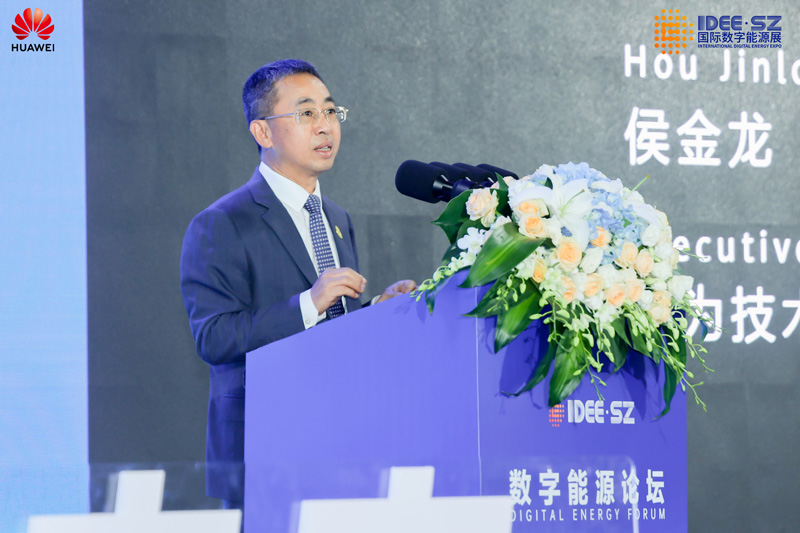[Shenzhen, China, June 29, 2023] The International Digital Energy Expo (IDEE) 2023 is unwrapped today and will last until July 2. This global event held in Shenzhen attracts leading enterprises, industry experts and organizations, as well as research institutes worldwide to discuss cutting-edge technologies, development paths, and practices of the digital energy industry. It aims to promote the construction of a green, efficient, flexible, intelligent, and sustainable energy system and accelerate the high-quality development of the digital energy industry.
At today's Digital Energy Forum themed on "Digital-driven Energy, Innovation-based Future", Hou Jinlong — President of Huawei Digital Power — delivered a keynote speech entitled "Integrate Digital and Power Electronics Technologies for a New Era of Digital Energy and a Better, Greener Future." According to President Hou, low-carbon, electrified, digital, and intelligent development are the four key paths for energy evolution and transformation. Now the energy industry has entered a new era of digital energy and will be deeply integrated with the digital world. Huawei Digital Power firmly adheres to its positioning as a technology product company and is committed to integrating digital and power electronics technologies to build energy infrastructure for new power systems, new-type electric vehicles (EVs), and new digital industries for a carbon-neutral future.
 Hou Jinlong, President of Huawei Digital Power, delivering a keynote speech
Hou Jinlong, President of Huawei Digital Power, delivering a keynote speech
Energy infrastructure for new power systems, urban energy systems, transportation energy networks, and residential energy systems, is undergoing accelerated transformation. Independent energy production or consumption are now integrated to achieve optimal resource allocation and use efficiency. Huawei Digital Power converges bit, watt, heat, and battery technologies and is committed to building new energy infrastructure for energy revolution, mobility revolution, and intelligent revolution in the following three aspects:
- New power system energy infrastructure
This type of infrastructure has three major application scenarios, including clean energy bases, urban energy systems with coordinated power generation, grids, loads, and storage, as well as home energy management systems.
In clean energy base scenarios, high proportions of renewable energy and power electronics applications, large base footprints, and remote locations pose challenges to grid connection and O&M. To overcome these challenges, Huawei Digital Power leverages the grid forming technology, which is applied to PV and energy storage systems (ESSs). By integrating digital and power electronics technologies, together with advanced grid connection technologies, the PV+ESS solution can proactively enhance the power grid and provide the functions of traditional synchronous generators, achieving the transformation from grid following to grid forming and making PV energy the mainstream energy source. In terms of O&M, Huawei Digital Power leverages IoT, big data, AI, and other ICTs to implement the smart diagnosis of plant faults, achieving intelligent and unattended PV plants.
In urban scenarios, it is a common call to build green, low-carbon energy intelligent twins and integrate generation, grid, load, storage, and consumption by integrating innovative products and solutions of distributed energy, virtual power plants (VPPs), smart charging networks, V2X, integrated smart energy, and smart microgrids. With joint efforts, a citywide energy Internet based on smart grids and smart microgrids for a safe, resilient, efficient, low-carbon, and intelligent city can be realized soon.
For home energy consumption, building a green, low-carbon, intelligent home energy management system with the optimizer+PV+ESS+charger+load+cloud one-stop solution will transform homes from energy consumers to prosumers in new power systems.
- New-type EV energy infrastructure
In the mobility electrification industry, Huawei Digital Power serves as a provider for the e-Mobility and FusionCharge solutions. Through on-board and off-board high-quality collaborative development, Huawei Digital Power launches the hyper-converged power system and the "one kilometer per second" super charging solution to help electric vehicles surpass fuel vehicles and achieve refueling-like charging experience. This accelerates the process of mobility electrification. Huawei Digital Power will cooperate with customers and partners to take the lead in developing supercharging solutions across China in hundred thousand gas stations, highway rest areas, and urban public areas, wherever with high traffic of electric vehicles. Our goal is to build a unified highway network and city network. Through the integration of PV, ESSs, and chargers, NEVs can use renewable energy power. In addition, high-quality charging networks should be compatible with vehicle models of various voltage levels. Various business models can bring better return on investment to charger operators and achieve a positive business cycle of sustainable development.
Today, Shenzhen City, Huawei Digital Power, and ecosystem partners announce to build Shenzhen into a supercharging hub with an integrated network for charge, energy storage, and discharge. In the future, Huawei Digital Power will help accelerate the construction of high-quality charging infrastructure in more cities across China.
- New digital industry energy infrastructure
Following the fast pace of digital transformation in all walks of life and the surging demands for connections and computing power worldwide, the number of data centers and telecom sites will double, the hunger for electricity and increasing carbon emissions will also pose challenges to us. Adhering to the principle of bringing more bits with less watts and less carbon emissions, Huawei Digital Power builds new digital industry energy infrastructure for data center facility, site power facility, and critical power supply solutions, to continuously reduce energy consumption and carbon emissions for generating each bit. Supported by digital and intelligent technologies, the energy infrastructure can play a key role in critical power supply and also be integrated into the urban energy intelligent twins where power generation, grid, loads, and storage are collaborated. The infrastructure is the energy consumer as well as regulator of energy production and power systems.
The digital energy industry is an ecosystem-based industry. Huawei Digital Power will adhere to continuous innovation in technologies and products and unswervingly work with industry and ecosystem partners to build a digital energy industry ecosystem and contribute to achieving carbon neutrality for humankind.

 Search
Search




 Search
Search


